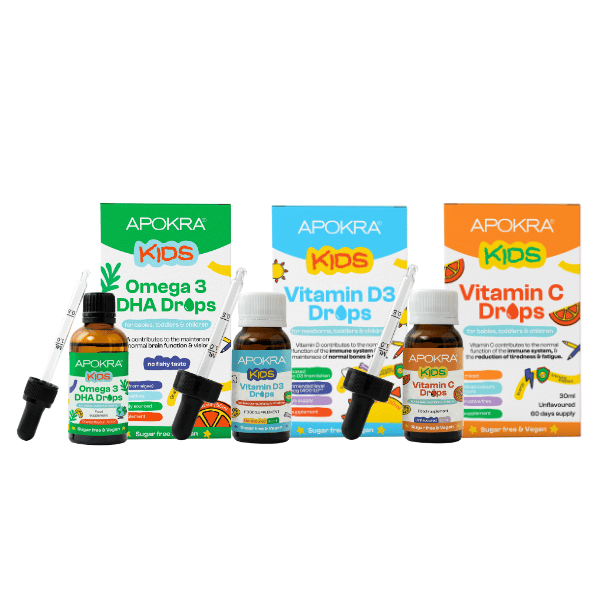How Much Omega-3 Should I Take?

It is important to understand the recommended daily intake of omega-3 to achieve the optimal health benefits.
Omega-3 fatty acids are essential nutrients that play a crucial role in overall health and well-being. They are known for several health benefits, including supporting heart health, brain function, eye health, and reducing inflammation in the body.
In this blog, we will discuss in detail how much omega-3 should be taken per day including the benefits of omega-3, omega-3 for brain health, omega-3 rich foods, vegan sources of omega-3 and omega-3 in pregnancy.
Benefits of Omega-3 within a Healthy Diet
Omega-3 fatty acids are polyunsaturated fats that are important for health. They comprise of three main types: alpha-linolenic acid (ALA), eicosapentaenoic acid (EPA), and docosahexaenoic acid (DHA). ALA is found in plant-based sources such as flaxseeds, chia seeds, and walnuts, while EPA and DHA are found in fatty fish such as salmon, mackerel, and sardines plus the plant-based source algal oil otherwise known as marine algae. Omega-3s are critical for several key functions within the body, including:
- Heart health: Omega-3s have been shown to reduce the risk of heart disease by lowering triglyceride levels, reducing inflammation, and improving blood pressure (1).
- Brain function: EPA and DHA are important for brain health and cognitive function, and have been linked to improved memory, concentration, and mood (2).
- Eye health: DHA is a major component of the retina, and omega-3s have been associated with a reduced risk of age-related macular degeneration (AMD), a leading cause of vision loss in older adults (3).
- Inflammation: Omega-3s have anti-inflammatory properties, which can help reduce inflammation in the body and alleviate symptoms of inflammatory conditions such as rheumatoid arthritis (4).
How Much Omega-3 per Day?
The recommended daily intake of omega-3s varies depending on age, sex, and specific health conditions. The American Heart Association recommends eating fish (particularly fatty fish) at least twice a week, which can provide enough EPA and DHA for most individuals. However, if you do not consume fish or have specific health conditions that may require higher omega-3 intake, supplements may be necessary. Below is a list of suggested omega-3 intakes from scientific sources:
For healthy adults: The NHS recommends consuming two servings of fish per week including 1 oily fish, which can provide around 500 mg of EPA and DHA per day (5).
For specific health conditions: Higher doses of omega-3s may be recommended for individuals with certain health conditions, such as high triglyceride levels, rheumatoid arthritis, or depression. In these cases, supplementation with EPA and DHA under the guidance of a healthcare professional may be necessary, with dosages ranging from 1,000 mg to 4,000 mg per day or higher (6).
For pregnant and breastfeeding women: Omega-3s are important for fetal brain and eye development (7), and pregnant and breastfeeding women are recommended to consume at least 200mg of DHA per day in addition to the recommended daily intake for a healthy adult of 250mg DHA according to European Food Safety Authority (EFSA) recommendations (8).
For vegetarians and vegans: Individuals following a vegetarian or vegan diet may need to pay extra attention to their omega-3 intake, as plant-based sources of omega-3s, such as ALA from flaxseeds, chia seeds, and walnuts, may not be as readily converted to EPA and DHA in the body as compared to EPA and DHA obtained from fatty fish. In such cases, supplementation with algal oil, which is derived from microalgae and contains EPA and DHA, may be necessary to meet the recommended intake (9).
What is the Minimum Amount of Omega-3s I Need in my Diet?
The minimum amount of omega-3s needed in the diet varies depending on age, sex, and specific health conditions. The National Institutes of Health (NIH) recommends a daily intake of 1.6 grams of ALA for adult males and 1.1 grams for adult females (10). However, it's important to note that ALA, which is found in plant-based sources, needs to be converted into EPA and DHA in the body, and this conversion is not very efficient. As such, consuming higher amounts of ALA may be necessary to meet the recommended intake of EPA and DHA.
How Much Omega-3 for Specific Health Conditions?
In some cases, higher doses of omega-3s may be recommended for individuals with specific health conditions. For example:
High Triglyceride Levels: For individuals with high triglyceride levels, doses of EPA and DHA ranging from 2 to 4 grams per day or higher may be recommended to help lower triglyceride levels (11).
Rheumatoid Arthritis: Omega-3s have been shown to have anti-inflammatory properties that may benefit individuals with rheumatoid arthritis. Doses of EPA and DHA ranging from 2.7 to 3.6 grams per day or higher may be recommended to help reduce inflammation and alleviate symptoms (12).
Depression: Some studies have shown that omega-3s, particularly EPA, may have a beneficial effect on mood and may be helpful in individuals with depression. Doses of EPA and DHA ranging from 1 to 2 grams per day or higher may be recommended as a supplement to antidepressant medications (13).
Recommended Intake of Omega-3s in Pregnancy:
Omega-3s are important for fetal brain and eye development during pregnancy. The American Pregnancy Association recommends that pregnant and breastfeeding women consume at least 200-300 mg of DHA per day (14). This is similar within Europe where the European Food Standards Authority recommend 200mg of DHA daily in addition to the recommended daily DHA level of 250mg for healthy adults (15). This can be obtained through fatty fish consumption or supplementation with a DHA-containing omega-3 supplement, as recommended by a healthcare professional.
How Much Omega-3 is Too Much?
While omega-3s are important for overall health, excessive intake of omega-3 supplements can have potential risks and side effects. High doses of omega-3s can increase the risk of bleeding, interact with certain medications, and cause digestive issues. The Food and Drug Administration (FDA) recommends that the total daily intake of EPA and DHA from supplements should not exceed 3 grams per day unless under the supervision of a healthcare professional (16). It's important to follow the recommended dosage instructions on the supplement label or as advised by a healthcare professional to avoid excessive intake.
Signs of Omega-3 Deficiency:
Omega-3 deficiency is relatively uncommon in healthy individuals with a balanced diet. However, some signs of omega-3 deficiency may include dry skin, brittle nails, poor concentration, mood swings, joint pain, and inflammation. If you think you may have an omega-3 deficiency, it's important to consult with a healthcare professional for assessment and appropriate recommendations for omega-3 supplementation.
In conclusion, the recommended daily intake of omega-3s varies depending specific health conditions. Consuming fatty fish, such as salmon, or supplementation with fish oil or algal oil can help meet the recommended intake of EPA and DHA. Plant-based sources of omega-3s, such as ALA from flaxseeds, may need to be consumed in higher amounts to achieve sufficient conversion to EPA and DHA.
It's important to note that omega-3 supplements are not a substitute for a healthy diet and lifestyle and omega-3 intake including higher doses should always be taken under guidance of a healthcare professional. A well-balanced diet that includes a variety of foods rich in omega-3s is essential for overall health and well-being
References:
- https://pubmed.ncbi.nlm.nih.gov/17324586/
- https://pubmed.ncbi.nlm.nih.gov/18072818/
- https://www.ncbi.nlm.nih.gov/pmc/articles/PMC3206354/
- https://www.ncbi.nlm.nih.gov/pmc/articles/PMC7362115/
- https://www.nhs.uk/live-well/eat-well/food-types/fish-and-shellfish-nutrition/
- https://ods.od.nih.gov/factsheets/Omega3FattyAcids-HealthProfessional/







Comments
Leave a comment
Your Email Address Will Not Be Published. Required Fields Are Marked *